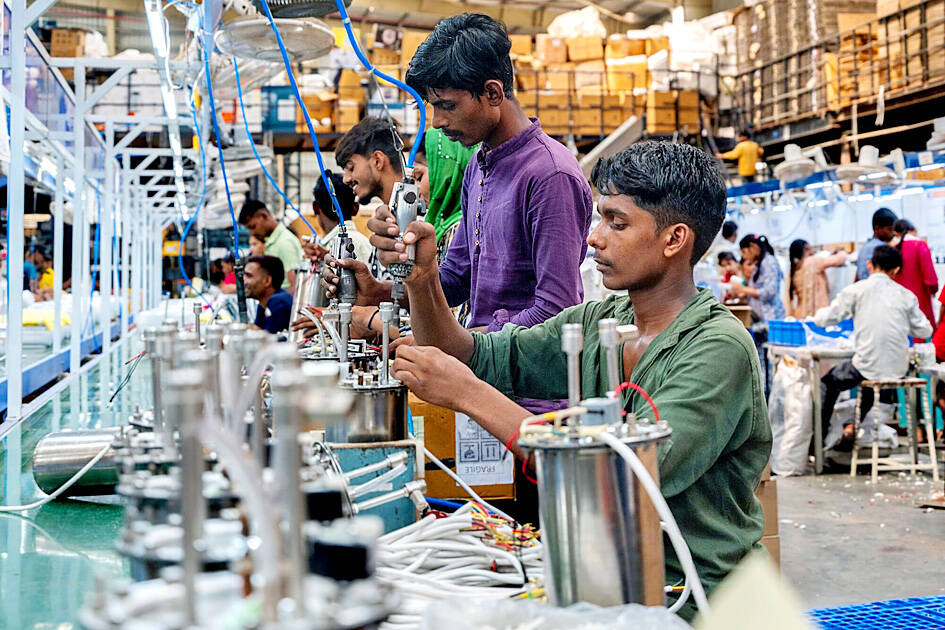Indian conglomerates are poised to nearly triple capital spending to US$800 billion over the next 10 years from the previous decade, as they pursue growth while putting the economy on the path to a greener future, S&P Global Ratings said.
About 40 percent of their spending would be on new businesses, such as green hydrogen, clean energy, semiconductors, electric vehicles and aviation, S&P Global said in a report yesterday.
India’s largest business houses, including the Adani Group, Reliance Industries Ltd and Tata Group, are set to spend about US$350 billion in these sectors, analysts led by S&P Global director Neel Gopalakrishnan wrote.

Photo: Anindito Mukherjee, Bloomberg
The likely investments dovetail with a broader vision of India’s political leadership to wean the economy from its dependence on fossil fuels to power the economy. The South Asian nation — the world’s third-largest carbon emitter — needs US$12.4 trillion in investment to achieve its goal of reaching net zero by 2070.
Other conglomerates — such as the Birla, Mahindra, Hinduja, Bajaj and the Murugappa groups — would focus on their established businesses to “boost scale and profitability,” the report said, adding that about US$400 billion to US$500 billion of all investments are expected to go into existing businesses.
While countries such as the US and South Korea have a history of family-owned large business groups with outsized capital concentration holding sway over the local economy, conglomerates such as those led by Reliance Industries chairman Mukesh Ambani and Adani Group chairman Gautam Adani, Asia’s two richest men, continue to be very powerful in India and their growth has mirrored the Indian government’s policy priorities.
Conglomerates would be boosting their market share over the next few years, with these groups having a substantial advantage over their non-conglomerated rivals in capital intensive sectors, S&P Global said.
That path to growth is not free of risks. It is likely the businesses would face execution risk and rely heavily on borrowing with little promise that the new technology would pay off, the report said.
As absolute debt levels rise, firms would need to continuously strengthen their core businesses to maintain their credit profiles, Gopalakrishnan said, adding that any underperformance during the investment phase would likely hit credit metrics.

When an apartment comes up for rent in Germany’s big cities, hundreds of prospective tenants often queue down the street to view it, but the acute shortage of affordable housing is getting scant attention ahead of today’s snap general election. “Housing is one of the main problems for people, but nobody talks about it, nobody takes it seriously,” said Andreas Ibel, president of Build Europe, an association representing housing developers. Migration and the sluggish economy top the list of voters’ concerns, but analysts say housing policy fails to break through as returns on investment take time to register, making the

NOT TO WORRY: Some people are concerned funds might continue moving out of the country, but the central bank said financial account outflows are not unusual in Taiwan Taiwan’s outbound investments hit a new high last year due to investments made by contract chipmaker Taiwan Semiconductor Manufacturing Co (TSMC, 台積電) and other major manufacturers to boost global expansion, the central bank said on Thursday. The net increase in outbound investments last year reached a record US$21.05 billion, while the net increase in outbound investments by Taiwanese residents reached a record US$31.98 billion, central bank data showed. Chen Fei-wen (陳斐紋), deputy director of the central bank’s Department of Economic Research, said the increase was largely due to TSMC’s efforts to expand production in the US and Japan. Investments by Vanguard International

WARNING SHOT: The US president has threatened to impose 25 percent tariffs on all imported vehicles, and similar or higher duties on pharmaceuticals and semiconductors US President Donald Trump on Wednesday suggested that a trade deal with China was “possible” — a key target in the US leader’s tariffs policy. The US in 2020 had already agreed to “a great trade deal with China” and a new deal was “possible,” Trump said. Trump said he expected Chinese President Xi Jinping (習近平) to visit the US, without giving a timeline for his trip. Trump also said that he was talking to China about TikTok, as the US seeks to broker a sale of the popular app owned by Chinese firm ByteDance Ltd (字節跳動). Trump last week said that he had

STRUGGLING TO SURVIVE: The group is proposing a consortium of investors, with Tesla as the largest backer, and possibly a minority investment by Hon Hai Precision Nissan Motor Co shares jumped after the Financial Times reported that a high-level Japanese group has drawn up plans to seek investment from Elon Musk’s Tesla Inc to aid the struggling automaker. The group believes the electric vehicle (EV) maker is interested in acquiring Nissan’s plants in the US, the newspaper reported, citing people it did not identify. The proposal envisions a consortium of investors, with Tesla as the largest backer, but also includes the possibility of a minority investment by Hon Hai Precision Industry Co (鴻海精密) to prevent a full takeover by the Apple supplier, the report said. The group is